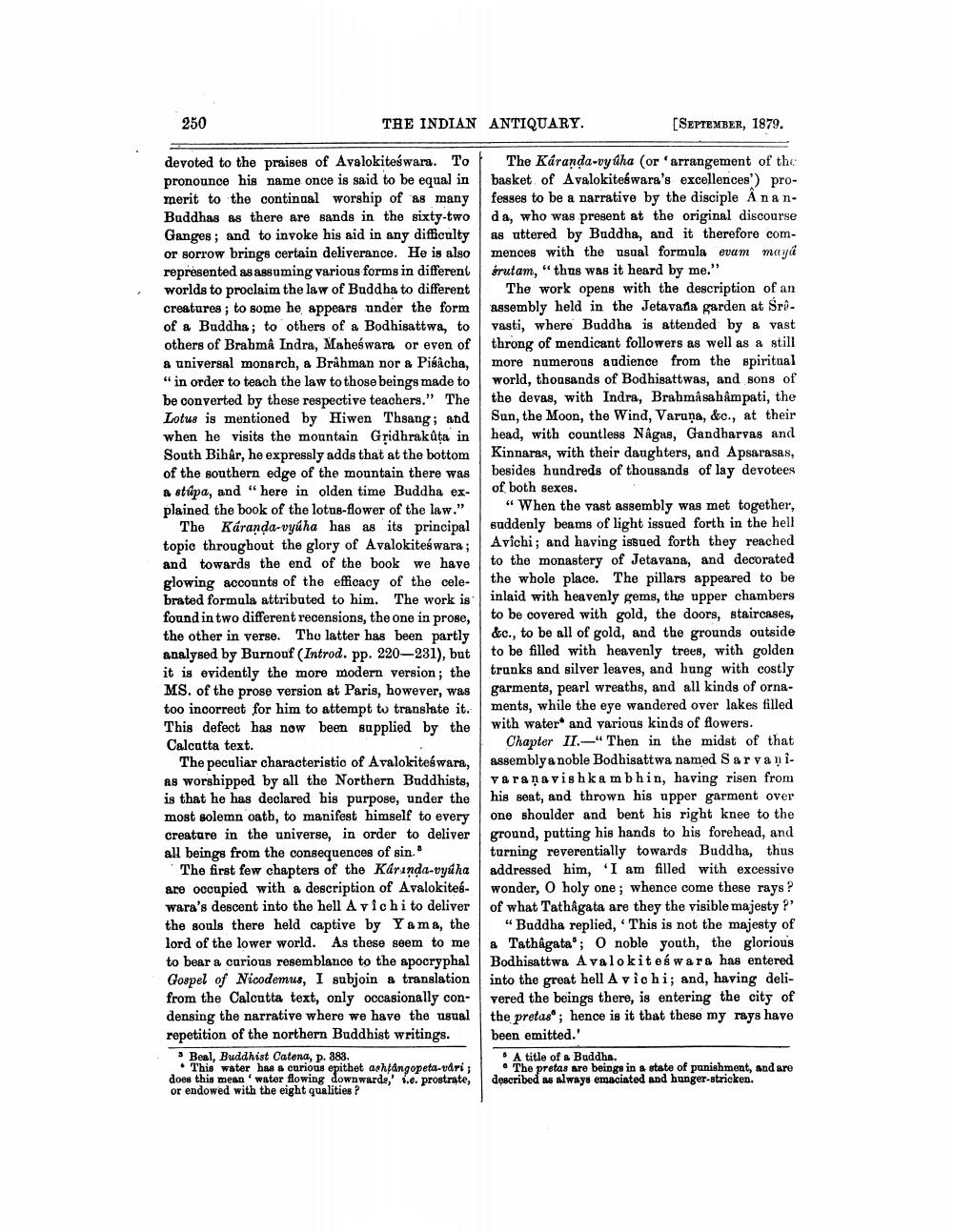________________
250
THE INDIAN ANTIQUARY.
devoted to the praises of Avalokiteswara. To pronounce his name once is said to be equal in merit to the continual worship of as many Buddhas as there are sands in the sixty-two Ganges; and to invoke his aid in any difficulty or sorrow brings certain deliverance. He is also represented as assuming various forms in different worlds to proclaim the law of Buddha to different creatures; to some he appears under the form of a Buddha; to others of a Bodhisattwa, to others of Brahmâ Indra, Maheswara or even of a universal monarch, a Brahman nor & Piśâcha, "in order to teach the law to those beings made to be converted by these respective teachers." The Lotus is mentioned by Hiwen Thsang; and when he visits the mountain Gridhrakûta in South Bihar, he expressly adds that at the bottom of the southern edge of the mountain there was a stúpa, and "here in olden time Buddha explained the book of the lotus-flower of the law."
The Karanda-vyúha has as its principal topic throughout the glory of Avalokiteś wara; and towards the end of the book we have glowing accounts of the efficacy of the celebrated formula attributed to him. The work is found in two different recensions, the one in prose, the other in verse. The latter has been partly analysed by Burnouf (Introd. pp. 220-231), but it is evidently the more modern version; the MS. of the prose version at Paris, however, was too incorrect for him to attempt to translate it. This defect has now been supplied by the Calcutta text.
The peculiar characteristic of Avalokiteś wara, as worshipped by all the Northern Buddhists, is that he has declared his purpose, under the most solemn oath, to manifest himself to every creature in the universe, in order to deliver all beings from the consequences of sin."
The first few chapters of the Karanda-vyúha are occupied with a description of Avalokiteswara's descent into the hell A vichi to deliver the souls there held captive by Yama, the lord of the lower world. As these seem to me to bear a curious resemblance to the apocryphal Gospel of Nicodemus, I subjoin a translation from the Calcutta text, only occasionally condensing the narrative where we have the usual repetition of the northern Buddhist writings.
[SEPTEMBER, 1879.
The Karanda-vy úha (or 'arrangement of the basket of Avalokiteswara's excellences') professes to be a narrative by the disciple Âna nda, who was present at the original discourse as uttered by Buddha, and it therefore commences with the usual formula evam maya śrutam, "thus was it heard by me."
Beal, Buddhist Catena, p. 383.
This water has a curious epithet ashtangopeta-vari; does this mean water flowing downwards,' .e. prostrate, or endowed with the eight qualities ?
The work opens with the description of an assembly held in the Jetavaña garden at Srivasti, where Buddha is attended by a vast throng of mendicant followers as well as a still more numerous audience from the spiritual world, thousands of Bodhisattwas, and sons of the devas, with Indra, Brahmâsahâmpati, the Sun, the Moon, the Wind, Varuna, &c., at their head, with countless Nâgas, Gandharvas and Kinnaras, with their daughters, and Apsarasas, besides hundreds of thousands of lay devotees of both sexes.
"When the vast assembly was met together, suddenly beams of light issued forth in the hell Avichi; and having issued forth they reached to the monastery of Jetavana, and decorated the whole place. The pillars appeared to be inlaid with heavenly gems, the upper chambers to be covered with gold, the doors, staircases, &c., to be all of gold, and the grounds outside to be filled with heavenly trees, with golden trunks and silver leaves, and hung with costly garments, pearl wreaths, and all kinds of ornaments, while the eye wandered over lakes filled with water and various kinds of flowers.
Chapter II." Then in the midst of that assembly a noble Bodhisattwa named Sarvanivaraṇavishka mbhin, having risen from his seat, and thrown his upper garment over one shoulder and bent his right knee to the ground, putting his hands to his forehead, and turning reverentially towards Buddha, thus addressed him, 'I am filled with excessive wonder, O holy one; whence come these rays? of what Tathagata are they the visible majesty ?'
"Buddha replied, 'This is not the majesty of a Tathagata; O noble youth, the glorious Bodhisattwa Avalokiteswara has entered into the great hell A vichi; and, having delivered the beings there, is entering the city of the pretas; hence is it that these my rays have been emitted.'
A title of a Buddha.
The pretas are beings in a state of punishment, and are described as always emaciated and hunger-stricken.




